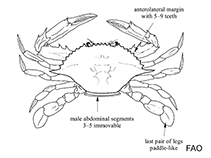Polybius henslowii Leach, 1820
Henslow's swimming crab| Native range | All suitable habitat | Point map | Year 2050 |

|
| This map was computer-generated and has not yet been reviewed. |
| Polybius henslowii AquaMaps Data sources: GBIF OBIS |
Google image | No image available for this species;
drawing shows typical species in Portunidae.
Classification / Names Common names | Synonyms | CoL | ITIS | WoRMS
Malacostraca | Decapoda | Portunidae
Environment: milieu / climate zone / depth range / distribution range Ecology
Benthic; depth range 0 - 500 m (Ref. 105053). Temperate; 62°N - 29°N, 34°W - 11°E
Distribution Countries | FAO areas | Ecosystems | Occurrences | Introductions
Eastern Atlantic and the Mediterranean: from North Sea, Norway down to Morocco, east to Balearic Islands, Mediterranean.
Length at first maturity / Size / Weight / Age
Maturity: Lm ? range ? - ? cm Max length : 4.4 cm CL male/unsexed; (Ref. 101417)
Life cycle and mating behavior Maturity | Reproduction | Spawning | Eggs | Fecundity | Larvae
Main reference
References | Coordinator | Collaborators
Gaspar, M.B., M.D. Dias, A. Campos, C.C. Monteiro, M.N. Santos, A. Chicharo and L. Chicharo 2001 The Influence of dredge design on the catch of Callista chione (Linaeus, 1758). Hydrobiologia 465:153-167. (Ref. 2714)
IUCN Red List Status
(Ref. 130435: Version 2025-1)
CITES status (Ref. 108899)
CMS (Ref. 116361)
Threat to humans
Human uses
Fisheries: commercial
| FishSource |
Tools
More information
Max. ages / sizes
Length-weight rel.
Length-length rel.
Length-frequencies
Mass conversion
Abundance
Internet sources
BHL | BOLD Systems | CISTI | DiscoverLife | FAO(Publication : search) | Fishipedia | GenBank (genome, nucleotide) | GloBI | Gomexsi | Google Books | Google Scholar | Google | PubMed | Tree of Life | Wikipedia (Go, Search) | Zoological Record



